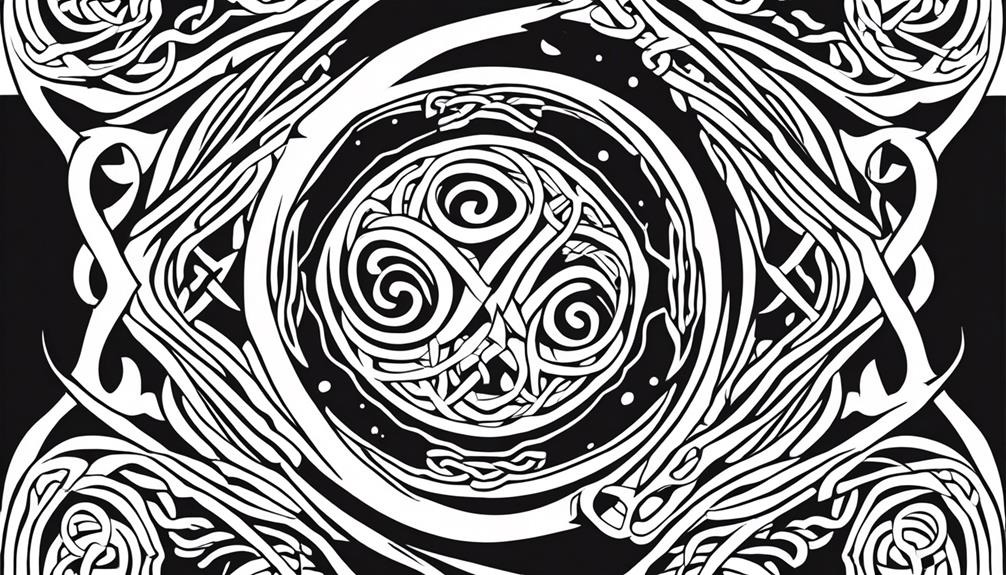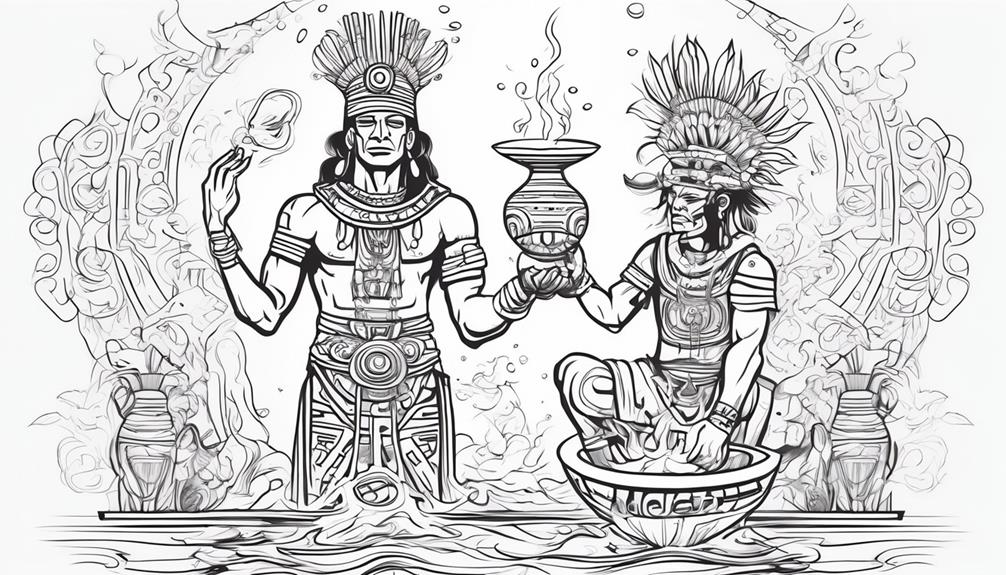Imagine the mighty Tigris and Euphrates rivers shaping the beliefs of ancient Mesopotamians, reflecting their profound connection to water as a symbol of life and power.
As you explore the diverse ancient cultures around the globe, each with its unique perspective on water symbolism, you'll uncover fascinating insights into how this essential element was revered, feared, and ceremonially embraced.
From the cleansing waters of the Nile in Egyptian religion to the mystical significance of rivers in Hinduism, the journey through these ancient beliefs promises a deep dive into the symbolic ocean of human spirituality.
Key Takeaways
- Water symbolizes life, purification, renewal, and spiritual transformation in various ancient beliefs.
- Rivers serve as boundaries and transitions between physical and spiritual realms, connecting different worlds.
- Water plays a central role in mythology and spiritual practices, representing creation, renewal, and the eternal struggle between order and chaos.
- Deities associated with water in different cultures embody aspects of life, fertility, purification, and spiritual transformation.
Water Symbolism in Mesopotamian Mythology
In ancient Mesopotamian mythology, water flowed as a powerful symbol of creation and chaos. The Mesopotamians believed that the universe began as a vast ocean of chaos, from which the gods emerged to bring order and structure. Water represented the primordial state of existence, a source of life and a force of destruction.
The god Enki, also known as Ea, was closely associated with water in Mesopotamian beliefs. He was the god of wisdom, magic, and freshwater, often depicted in art pouring water from jars, symbolizing the life-giving and purifying qualities of water. Enki's connection to water emphasized its importance in sustaining life and fostering growth in the harsh desert environment of Mesopotamia.
Moreover, water played a crucial role in Mesopotamian religious rituals and beliefs. The Tigris and Euphrates rivers, which flowed through the region, were seen as sacred sources of life and fertility. The annual flooding of these rivers was viewed as a symbol of divine benevolence, providing nourishment for crops and sustaining civilization. In essence, water in Mesopotamian mythology wasn't just a physical element but a profound symbol of creation, renewal, and the eternal struggle between order and chaos.
The Role of Water in Egyptian Religion
Water, having symbolized creation and chaos in ancient Mesopotamian mythology, played a significant role in Egyptian religion as well. In Egyptian beliefs, the Nile River was central to their civilization, representing life, fertility, and rebirth. Let's explore some key aspects of water symbolism in Egyptian religion:
| Symbol | Meaning |
|---|---|
| Nile River | Source of life, fertility, and abundance. |
| Osiris | God of the afterlife associated with the Nile's annual flooding, symbolizing renewal and resurrection. |
| Nun | Primordial waters from which the world was created, representing chaos and potential. |
| Ankh | Symbol resembling a key that represents life and immortality, often depicted being offered by water-related deities. |
| Lake of Fire | In the afterlife, the dead had to pass through this lake, symbolizing purification and transformation. |
Water in Egyptian religion served as a powerful symbol of life, death, and the cyclical nature of existence, deeply intertwined with their spiritual beliefs and practices.
Water as a Purifier in Hinduism
Flowing through the spiritual practices of Hinduism, water serves as a cleansing agent that purifies the body and soul. In Hindu rituals, water plays a crucial role in purifying individuals before prayers or ceremonies. The act of bathing in sacred rivers like the Ganges is believed to wash away impurities and sins, allowing for spiritual renewal. Imagine the tranquil waters gently washing over you, carrying away negativity and leaving you feeling refreshed and spiritually cleansed.
Water is also used in ceremonies where devotees sprinkle drops of water on themselves and others to purify the mind, body, and soul. This symbolic act represents the washing away of past wrongdoings and the beginning of a new, pure phase in life. Picture the clear droplets shimmering in the sunlight as they cleanse and renew your spirit.
In Hinduism, water isn't just a physical element but a powerful symbol of purity and spiritual transformation. Embracing the purifying nature of water in Hindu practices can help you seek inner clarity and renewal, washing away the impurities of the past and paving the way for a brighter spiritual journey ahead.
Water Symbolism in Greek Mythology
With its mystical allure and captivating depths, Greek Mythology weaves intricate tales of water's symbolic significance in the ancient beliefs of the Greeks. Water in Greek Mythology often represented both chaos and creation, embodying both the giver and taker of life.
| Water Symbol | Meaning in Greek Mythology |
|---|---|
| Oceanus | The river that encircled the world, representing the boundary between the known and unknown. |
| Styx | The river of hatred, symbolizing an unbreakable oath when the gods swore upon it. |
| Poseidon's Trident | The symbol of power and control over the seas, reflecting authority and the ability to cause storms or calm waters. |
These symbols showcased the Greeks' deep connection to water, viewing it as a force that shaped both the physical and metaphysical worlds. Whether as a boundary between realms or a source of divine power, water in Greek Mythology held a profound significance that resonated throughout their stories.
Water Rituals in Ancient Chinese Beliefs
In Chinese beliefs, water rituals hold a sacred place, mirroring the reverence for water seen in Greek Mythology. Ancient Chinese civilization viewed water as a powerful force, essential for life and prosperity. Water rituals were deeply ingrained in their spiritual practices, symbolizing purification, renewal, and balance.
One prominent water ritual was the Dragon Boat Festival, where dragon-shaped boats raced to honor Qu Yuan, a revered poet and minister. This festival symbolized the river's attempt to recover his body after he drowned himself in protest. The rhythmic paddling and splashing of water during the races were believed to ward off evil spirits and bring good fortune.
Another significant ritual was the practice of tossing coins into natural water sources like rivers or wells as offerings to the water deities. This gesture was a way to seek blessings for abundant harvests, smooth sailing, and overall well-being. The glittering coins sinking into the water symbolized a connection between the earthly realm and the divine water spirits, ensuring harmony and prosperity.
The Sacredness of Water in Native American Traditions
Water, revered as a sacred element, plays a central role in the spiritual beliefs of Native American traditions. For many Native American tribes, water symbolizes purification, healing, and the source of life itself. In their traditions, water is not just a physical element but a spiritual force that connects all living beings.
—
| Native American Tribe | Symbolism of Water |
|---|---|
| Navajo | Represents the source of life and a key element in healing ceremonies. |
| Lakota | Signifies purification and the cleansing of the mind, body, and spirit. |
| Cherokee | Seen as a symbol of renewal, growth, and the flow of time and seasons. |
| Hopi | Represents the cycle of life, from birth to death, and the importance of balance. |
—
These tribes often perform rituals and ceremonies near bodies of water to honor and connect with the spiritual essence of water. The deep respect for water in Native American traditions serves as a reminder of the interconnection between nature and spirituality.
Water Symbolism in Celtic Mythology

Let's explore how Celtic deities were closely connected to water, with rivers often seen as sacred boundaries in Celtic mythology.
Additionally, the significance of healing springs in Celtic beliefs can offer a glimpse into the profound symbolism of water in their ancient traditions.
Get ready to uncover the mystical and spiritual connections between the Celts and the element of water.
Celtic Deities and Water
Amidst the ancient tales of Celtic mythology, the deities' deep connection to the element of water flows as a powerful symbol of life and renewal.
- Manannán mac Lir: Known as the god of the sea, he controlled the oceans and was a source of both bounty and mystery.
- Brigid: Revered as a goddess of healing springs, her presence brought forth waters with transformative and purifying qualities.
- Lir: Associated with the sea, representing both its tranquility and its fierce, untameable nature.
- Danu: The mother goddess, often linked to rivers and wells, embodying the nurturing and life-giving aspects of water in Celtic beliefs.
Rivers as Boundaries
In Celtic mythology, the significance of rivers as boundaries emerges as a defining element, shaping the symbolic connection to water in profound ways. Imagine the rivers acting as more than just physical divides; they become spiritual and metaphysical barriers in the Celtic belief system. These rivers were not only seen as natural borders but also as thresholds between the earthly realm and the Otherworld, a place of divine beings and spirits.
—
| Celtic Mythological Concept | Description | Importance |
|---|---|---|
| Rivers as Boundaries | Dividing physical and spiritual realms | Symbolic threshold between worlds |
| Otherworld | Realm of divine beings | Connection to spiritual existence |
| Thresholds | Spiritual and metaphysical barriers | Transition points between realms |
Healing Springs Significance
Healing springs in Celtic mythology serve as powerful symbols of rejuvenation and spiritual renewal, embodying the essence of water's transformative qualities. These sacred waters hold deep significance in Celtic beliefs, representing purity, healing, and connection to the divine.
- Healing Powers: The waters were believed to possess miraculous healing properties, curing ailments of the body and spirit.
- Spiritual Cleansing: Bathing in these springs was thought to cleanse the soul, purifying one from negative energies.
- Renewal and Rebirth: Immersing oneself in the waters symbolized a fresh start, a rebirth of the self.
- Connection to Nature: The springs were seen as conduits between the physical realm and the spiritual world, bridging the gap between mortals and the divine.
The Significance of Water in Aztec Religion

Let's explore the importance of water in Aztec religion.
Aztec culture revered water deities, used water for ritual purification, and saw water as a crucial symbol in their sacrificial practices.
Water played a central role in Aztec spiritual beliefs and practices, shaping their understanding of the divine and the sacred.
Aztec Water Deities
Immerse yourself in the captivating world of Aztec mythology, where water flows as a sacred symbol intertwined with the divine essence of their deities. The Aztecs revered water and had various deities associated with its power:
- Tlaloc: The rain god who controlled fertility and agricultural abundance.
- Chalchiuhtlicue: The goddess of lakes, rivers, and seas, representing beauty and youth.
- Huehuecoyotl: The Old Coyote god linked to music, dance, and mischief, often depicted near water sources.
- tlaloques: These were minor rain gods, assistants to Tlaloc, responsible for the beneficial rain that nourished crops.
Water in Aztec religion symbolized life, purification, and the cyclical nature of existence, deeply ingrained in their spiritual beliefs.
Ritual Purification Practices
In the realm of Aztec spirituality, water transcends mere physical substance to embody the essence of ritual purification practices, weaving through the fabric of their religious beliefs with profound symbolism.
Imagine standing by a sacred cenote, a natural well, as priests guide you through the ritual of purification. Water cascades over you, washing away impurities and sins, leaving you spiritually cleansed.
The Aztecs believed that water was a conduit to connect with the divine, a medium through which they could cleanse their souls and renew their connection to the gods. This act of purification wasn't just a physical cleansing but a spiritual rebirth, a way to ensure harmony with the cosmos and maintain order in the world.
Symbolism in Sacrifices
As you emerged from the cleansing waters, the significance of water in Aztec religion becomes even more apparent in the symbolism embedded within their sacrificial practices.
- Water as a Conduit:
- Water was seen as a conduit between the physical and spiritual realms during sacrifices.
- Purification Symbolism:
- Water symbolized purification, cleansing the offering before presenting it to the gods.
- Life and Renewal:
- Water represented life and renewal, essential elements in the cyclical nature of sacrifices.
- Connection to Deities:
- The act of sacrificing into water signified a direct connection to the Aztec deities, emphasizing the sacredness of the ritual.
Water, in Aztec sacrificial rites, wasn't just a physical element but a symbol deeply intertwined with their religious beliefs and practices.
Water Symbolism in Norse Mythology

Water in Norse mythology flows as a powerful force, shaping the beliefs and stories of the ancient Norse people. In these tales, the vast oceans represent the unknown and the chaotic, while the rivers symbolize the flow of time and destiny. The sea, called Ægir, is both feared and revered, showcasing the unpredictable nature of life. It's said that the Midgard Serpent, Jormungandr, encircles the world, creating tides with its movements, embodying the eternal cycle of destruction and rebirth.
Norse mythology also features wells and springs as sources of wisdom and knowledge. The Well of Urd, located beneath Yggdrasil, the World Tree, holds the origins of all life. Drinking from this well grants immense insight and foresight, connecting individuals to the past, present, and future.
Moreover, the concept of Ragnarok, the end of the world in Norse beliefs, involves a great flood that engulfs the earth, cleansing it for a new beginning. Water, in all its forms, serves as a potent symbol of transformation, renewal, and the eternal cycles of existence in Norse mythology.
Frequently Asked Questions
How Did Water Symbolism Differ Between Mesopotamian and Egyptian Beliefs?
In Mesopotamian beliefs, water symbolized chaos and destruction, often associated with Tiamat, the primordial goddess of the sea. Conversely, Egyptians viewed water as a source of life and renewal, linking it to the Nile's annual flooding and abundance.
Are There Any Specific Rituals or Ceremonies Involving Water in Hinduism That Are Not Mentioned in the Article?
In Hinduism, water plays a crucial role in various rituals like the holy dip in the Ganges River. It symbolizes purification and spiritual cleansing. Embrace the sacredness of water as you explore the rich traditions of Hindu ceremonies.
What Role Did Water Play in Chinese Beliefs Outside of the Mentioned Water Rituals?
Water in Chinese beliefs served as a symbol of purification, balance, and renewal. It was often associated with the flow of qi energy and the concept of yin and yang. These beliefs influenced various aspects of Chinese culture.
How Did Native American Traditions View Bodies of Water That Are Not Mentioned in the Article?
When considering bodies of water beyond what's covered, Native American traditions often viewed them as sacred mirrors reflecting connection to spirits and nature's rhythms. These waters symbolized unity, renewal, and spiritual cleansing.
Are There Any Lesser-Known Water Symbols in Celtic Mythology That Were Not Discussed in the Article?
In Celtic mythology, lesser-known water symbols include the "Well of Wisdom" representing knowledge and the "River Boyne" symbolizing strength and endurance. Exploring these symbols can deepen your understanding of Celtic beliefs and traditions.
Conclusion
So, now you've learned about the fascinating water symbolism in ancient beliefs.
But you might be thinking, 'Why should I care about this?'
Well, understanding these symbols can give you insight into the deep spiritual connections our ancestors had with water, showing us the universal importance of this life-giving element in shaping cultures worldwide.
Next time you see a body of water, remember the rich history and symbolism it holds.
